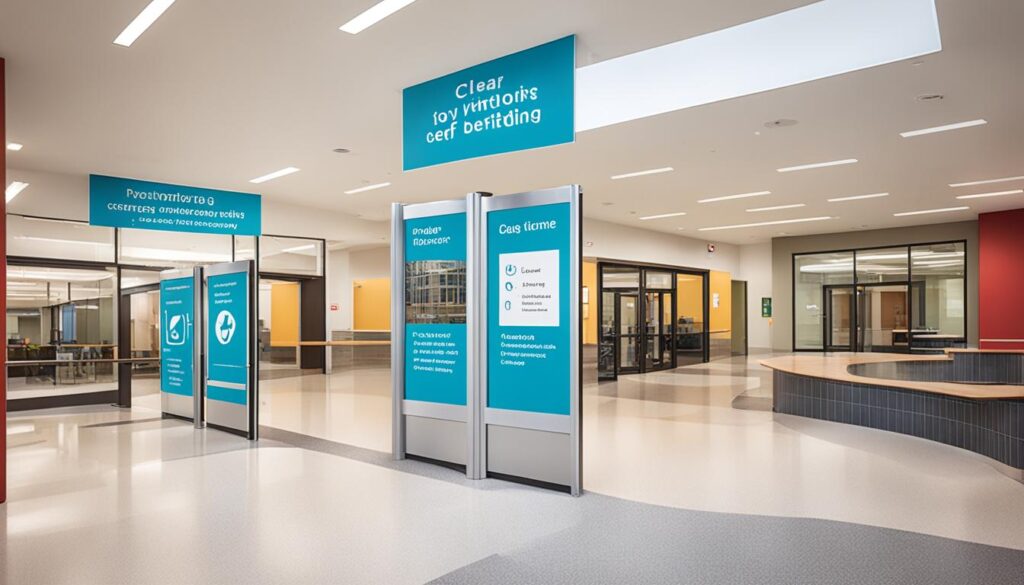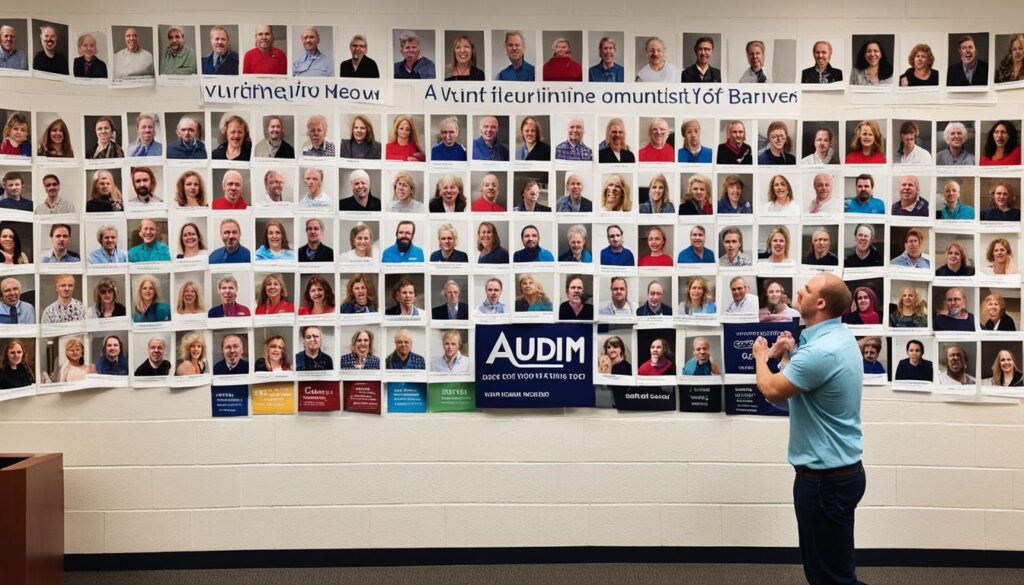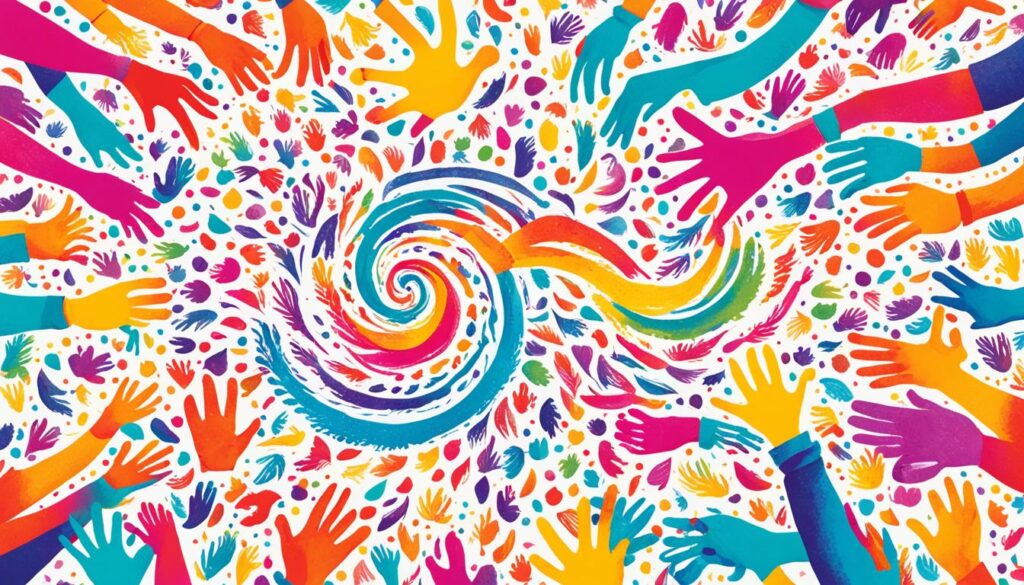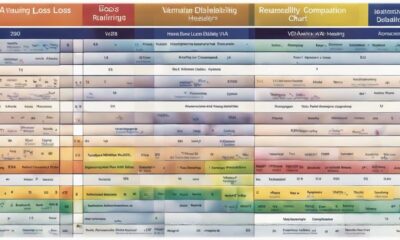Daily Life and Communication
Empowering Deaf Ministry Programs & Support

Were you aware that around the globe, it’s estimated that 466 million individuals are afflicted with hearing loss that impairs their daily functions?
For individuals who are Deaf, hard of hearing, late-deafened, or Deafblind, finding inclusive religious services can be a challenge. That’s where Deaf ministry programs step in, providing support and resources to create vibrant faith-based communities for the Deaf community.
In this article, we will explore best practices for building and expanding Deaf ministry programs, including the importance of hospitality, accessibility, widening the scope of the ministry, addressing audism, being missional, integrating Deaf culture, providing fellowship opportunities, supporting diverse communication modalities, offering sign language classes, and empowering Deaf individuals.
- Deaf ministry programs aim to foster inclusion and provide resources for the Deaf community.
- Hospitality and accessibility are essential for the success of a Deaf ministry.
- Widening the scope of the ministry can involve mission work and outreach to other populations.
- Addressing audism within the ministry is crucial to create equal opportunities for Deaf individuals.
- Being missional goes beyond charity and involves building relationships and engaging with the Deaf community.
Hospitality as a Key Aspect
Hospitality plays a vital role in the success of a Deaf ministry. It is more than just providing a place for Deaf individuals to gather; it encompasses creating a welcoming spirit that fosters inclusivity and accessibility. By embracing the principles of hospitality, churches can cultivate an environment where Deaf individuals feel valued and empowered to fully participate in the ministry.
The basic elements of hospitality are simple yet impactful. A smile, a warm welcome, and an invitation can make a significant difference in the experience of Deaf individuals in the church community. These small gestures communicate a genuine desire to connect and create a sense of belonging.
To further enhance hospitality, it is essential to make the church accessible to Deaf individuals. Architectural modifications, such as ramps and accessible bathrooms, promote inclusivity and ensure that Deaf individuals can easily navigate the physical space without barriers. Additionally, providing assistive listening devices, sign language interpretation, and captioning services during services and events promotes communication accessibility, allowing Deaf individuals to fully engage with the ministry.
“Hospitality is making your guests feel at home, even if you wish they were.”
Creating a welcoming and inclusive atmosphere extends beyond the physical aspects. It involves fostering a culture of acceptance and understanding within the church community. This can be achieved by educating members about Deaf culture and encouraging them to learn basic sign language. By embracing Deaf culture, churches can bridge the communication gap and foster a deeper connection with Deaf individuals.
Ultimately, hospitality is about creating an atmosphere that celebrates diversity and embraces the unique needs of Deaf individuals. It is through hospitality that churches can truly embody the welcoming spirit, inclusivity, and accessibility that are the foundations of a vibrant and thriving Deaf ministry.

Accessibility for Deaf Individuals
Ensuring accessibility is a vital commitment of the church to make the Deaf community feel valued, welcome, and included in all aspects of the ministry. This includes three key areas of accessibility: architectural accessibility, communication accessibility, and attitudinal accessibility.
Architectural Accessibility
Architectural accessibility refers to the physical environment of the church that accommodates the needs of Deaf individuals. By implementing architectural accessibility features, such as ramps and accessible bathrooms, churches can create an inclusive space that eliminates barriers for individuals with mobility challenges. These design elements not only benefit Deaf individuals but also facilitate the participation of others with disabilities.
Communication Accessibility
Communication accessibility is essential for effective interaction and engagement with Deaf individuals. By providing communication accommodations, churches can ensure that all members of the congregation can fully participate in worship services, activities, and events. Some key communication accessibility tools and practices include:
- Sign language interpreters: by booking qualified interpreters for services, sermons, and other important events, Deaf individuals can have access to the spoken word.
- Assistive listening devices: these devices amplify sound, making it easier for individuals with hearing impairments to participate in conversations and gatherings.
- Captioning: by providing captioning services during sermons and presentations, Deaf individuals who rely on written communication can fully understand and engage with the message.
- Visual aids: incorporating visual aids, such as slides or videos with captions, enhances understanding and accessibility for Deaf individuals.
- Other communication modalities: recognizing and supporting various communication modalities, such as lip-reading or tactile signing, can further enhance accessibility and inclusivity.
Attitudinal Accessibility
Attitudinal accessibility centers around fostering an inclusive mindset within the church community. It involves promoting an environment where Deaf individuals are valued, respected, and treated as equals. By challenging misconceptions or biases about deafness, churches can create an atmosphere that embraces diversity and appreciates the contributions of Deaf individuals. Attitudinal accessibility also involves providing opportunities for Deaf individuals to actively participate in decision-making processes, leadership roles, and other aspects of the ministry, ensuring they have a voice and are empowered within the community.
Accessibility Area Description Architectural Accessibility Features such as ramps and accessible bathrooms Communication Accessibility Sign language interpreters, assistive listening devices, captioning, visual aids, and support for various communication modalities Attitudinal Accessibility Fostering an inclusive mindset, valuing and respecting Deaf individuals, and providing opportunities for participation and leadership

By committing to architectural accessibility, communication accessibility, and attitudinal accessibility, churches can create an environment where Deaf individuals feel included, empowered, and able to fully participate in the life of the ministry.
Widening the Scope of the Ministry
To expand a Deaf ministry and make a greater impact, churches can consider engaging in mission work and reaching out to other populations within the Deaf community. This includes providing pastoral assistance to Deaf and hard of hearing individuals in local shelters and establishing programs specifically tailored for the Deafblind and hard of hearing seniors in the congregation. By widening the scope of the ministry and extending support to various subgroups, churches can create a more inclusive and comprehensive spiritual community for all individuals within the Deaf community.
One way to broaden the outreach of the ministry is through mission work. Churches can collaborate with other organizations to provide support and resources to Deaf individuals in remote areas or those facing unique challenges. Mission trips can offer opportunities to engage with Deaf communities in different regions, creating connections and fostering a sense of unity.
Another aspect of widening the scope of the ministry is addressing the specific needs of other populations within the Deaf community. This includes individuals who are hard of hearing or Deafblind. By offering specialized programs and services, churches can cater to their specific needs and ensure they feel seen, valued, and included. For instance, churches can organize tactile sign language classes for the Deafblind or provide assistive listening devices for those who are hard of hearing.
Expanding the ministry to include other populations within the Deaf community not only allows for a more comprehensive approach to support but also enhances the sense of belonging and community among all individuals. Creating an inclusive environment where everyone’s unique needs are recognized and met is vital for fostering a thriving and empowered Deaf ministry.

Examples of Widening the Scope of Ministry
Here are a few examples of how churches can widen the scope of their Deaf ministry:
- Establishing partnerships with local organizations that serve the Deaf community, such as schools for the Deaf or Deaf advocacy groups, to collaborate on events and initiatives.
- Organizing sign language workshops or community classes that invite individuals from different backgrounds, promoting cross-cultural understanding and inclusivity.
- Providing resources and training for churches in nearby areas to develop their own Deaf ministries, encouraging the growth of supportive communities beyond just one church.
“By widening the scope of the ministry to include mission work and outreach efforts to other populations, churches can expand their impact within the Deaf community and create a more inclusive and supportive environment for all individuals.” – Rev. Sarah Thompson
Addressing Audism
Audism is a harmful negative bias against Deaf people, rooted in the belief that they are incapable of certain actions or unfit to hold leadership positions due to their deafness. In the context of Deaf ministries, it is essential for churches to reflect on their motivations and ensure they do not perpetuate audism by pitying or paternalizing the Deaf community. Instead, churches should actively provide equal opportunities for Deaf individuals to assume leadership roles within their ministry.
Challenging audism within the ministry requires a conscious effort to recognize and confront any signs of negative bias. This can be achieved by promoting inclusivity and actively seeking out Deaf individuals for leadership opportunities. By intentionally creating a culture of equality, churches can empower Deaf individuals to share their unique perspectives and talents, contributing to the growth and enrichment of the ministry as a whole.
“Audism undermines the potential of individuals who are Deaf and perpetuates a harmful narrative that deafness is a limitation rather than a unique aspect of identity.” – [Author Name]
Embracing Deaf leadership within the ministry not only combats audism but also enriches the overall experience for the entire community. Deaf leaders offer a valuable perspective and insight, drawing from their lived experiences and deep understanding of Deaf culture and identity. This diversity of leadership enhances the ministry’s ability to connect with and cater to the needs of the Deaf community.
By actively addressing audism and providing leadership opportunities, churches can foster an environment that celebrates and uplifts the abilities and contributions of Deaf individuals. This commitment to inclusivity strengthens the ministry and reflects the core values of love, acceptance, and empowerment.

Being Missional
Being missional goes beyond merely providing services to the Deaf community. It involves moving beyond charity and actively building genuine relationships with the community. By finding a niche within their locality, churches can engage in mission work that addresses specific needs and fosters meaningful connections.
Mission work presents an opportunity to offer pastoral assistance and support to the Deaf community. By extending a helping hand and being present in times of need, churches can build trust and strengthen relationships with Deaf individuals and their families.
Establishing Programs for Specific Needs
Furthermore, churches can establish programs that cater to the unique needs of the Deaf community. These programs can include workshops, classes, and support groups that address topics such as Deaf culture, mental health, and spiritual guidance. By proactively meeting these needs, churches demonstrate their commitment to the well-being and growth of the Deaf community.
Through regular fellowship opportunities and social events, churches can create spaces for Deaf individuals to come together, form connections, and build a sense of community. These gatherings provide a platform for sharing experiences, exchanging ideas, and fostering an inclusive and supportive environment.
“Being missional is about developing long-term relationships built on trust and mutual respect. It’s not just about providing services, but also about genuinely caring for the Deaf community and being present in their lives.”
Ultimately, being missional requires churches to actively engage with the Deaf community and seek meaningful ways to make a positive impact. By focusing on mission work, establishing programs, and fostering community engagement, churches can create a supportive environment that empowers Deaf individuals and strengthens the Deaf ministry.

Understanding Deaf Culture
For churches with Deaf ministries, it is crucial to develop an understanding of Deaf culture and incorporate it into their services and activities. While comprehending the intricacies of this rich culture may be limited for hearing individuals, making a genuine effort to learn about Deaf culture can significantly enhance hospitality and inclusivity within the ministry.
One way to embrace Deaf culture is by incorporating elements that reflect the unique experiences and traditions of the Deaf community. This can include incorporating visual arts, storytelling, and poetry that are significant to Deaf culture. Furthermore, it is important to involve Deaf individuals in the planning and decision-making processes of the ministry, ensuring their voices are heard and valued.

By incorporating Deaf cultural elements and involving Deaf individuals, churches can create a more inclusive and welcoming environment for the entire community. This inclusive approach fosters a sense of belonging and respect, promoting a deeper connection between the ministry and the Deaf community.
Providing Fellowship Opportunities
Deaf individuals often seek a faith community not only for spiritual support but also for social connection. Creating regular fellowship opportunities is vital to fostering a sense of belonging and building relationships within the Deaf community. Churches can organize a variety of events and activities that cater specifically to the needs and interests of Deaf individuals, promoting a strong sense of community and social engagement.
Deaf Fellowship
Bible studies are a wonderful way to bring together Deaf individuals to study and discuss spiritual teachings. By providing sign language interpretation or using video resources with captions, churches can ensure that these gatherings are accessible to all. It’s also beneficial to invite Deaf individuals to lead the Bible study sessions, allowing them to share their unique perspectives and insights.
Community meals play a significant role in fostering fellowship among Deaf individuals. Churches can organize regular potluck gatherings or community meals, where everyone can come together to share a meal and enjoy each other’s company. These events provide a relaxed and informal setting for Deaf individuals to connect and build relationships with others in the church.
Social Events
In addition to Bible studies and community meals, churches can organize various social events that cater to the interests of the Deaf community. These events can include movie nights with open captioning, game nights, talent shows, or even outdoor activities such as picnics or hikes. By offering a diverse range of social events, churches can ensure that Deaf individuals have ample opportunities to come together, have fun, and form lasting connections.
Building an Inclusive and Supportive Community
By providing fellowship opportunities for Deaf individuals, churches demonstrate their commitment to building an inclusive and supportive community. These gatherings offer a safe and welcoming space where Deaf individuals can forge meaningful friendships, feel heard, and share their experiences with others who understand their unique challenges and perspectives.
Examples of Fellowship Opportunities for Deaf Individuals
| Event | Description |
|---|---|
| Bible Studies | Regular gatherings for Deaf individuals to study and discuss spiritual teachings, with sign language interpretation or accessible resources. |
| Community Meals | Potluck gatherings or community meals where Deaf individuals can come together to share a meal and build relationships. |
| Social Events | Movie nights, game nights, talent shows, picnics, hikes, and other activities that provide opportunities for Deaf individuals to socialize and have fun. |

Supporting Communication Accessibility
Ensuring effective communication is a vital aspect of a Deaf ministry. Churches should prioritize accessibility by supporting various communication modalities that cater to the needs of Deaf individuals. By providing sign language interpretation, lip-reading support, assisted listening devices, and captioning services, churches can create an environment that values inclusive communication.
Sign language interpretation plays a crucial role in facilitating communication between hearing and Deaf individuals. By having trained interpreters available during services and events, churches can bridge the communication gap and foster meaningful connections. Lip-reading support is another essential element in enhancing communication accessibility. Churches can provide resources and training to empower individuals to effectively communicate through lip-reading.
“Accessibility in communication is not just about the provision of resources, but also about fostering an environment where every individual feels valued and understood.”
Assisted listening devices, such as hearing loops and FM systems, can greatly benefit individuals with hearing impairments. These devices amplify sound directly into hearing aids or cochlear implants, ensuring clearer and more accessible audio experiences. Additionally, captioning services enhance communication accessibility for individuals who rely on written text to understand spoken content. Providing captions for sermons, videos, and other multimedia resources allows Deaf individuals to fully engage and participate.

By prioritizing and supporting these communication accessibility measures, churches demonstrate a commitment to inclusivity and ensure that Deaf individuals can actively engage in the spiritual life of the congregation.
Offering Sign Language Classes
Churches can offer sign language classes to their congregation and the wider community. These classes help in building relationships and connecting Deaf and hard of hearing individuals with others in the church.
When choosing sign language programs or resources, it is important to prioritize programs with Deaf instructors, Deaf cultural content, and a balanced focus on vocabulary and grammar. By learning from instructors who are Deaf themselves, students can gain a deeper understanding of the language and its cultural nuances. Additionally, incorporating Deaf cultural content in the curriculum helps students appreciate and respect the rich heritage of the Deaf community.
Online resources, such as ASL Connect and the United Methodist Committee of Deaf and Hard of Hearing Ministries, can supplement sign language training provided by Deaf-led programs. These resources offer interactive lessons, video demonstrations, and practice exercises to enhance learning and provide additional support outside of the classroom. By utilizing these resources, churches can provide a well-rounded sign language education to their community.

Periodic Evaluations
Regular evaluations of the Deaf ministry are crucial to assess its effectiveness and identify areas that require improvement. Churches must evaluate the inclusivity of their ministry, the presence of Deaf individuals in leadership positions, the provision of sign language classes, and the existence of audism within the community. These evaluations allow churches to refine their approach and ensure that the Deaf ministry continues to meet the evolving needs of the community.
Evaluating Inclusivity
Churches should assess the inclusivity of their Deaf ministry by evaluating the extent to which Deaf individuals feel welcomed, valued, and included in all aspects of the ministry. This evaluation entails gathering feedback from Deaf participants and considering their perspectives. It also involves ensuring that Deaf individuals have equal opportunities to participate in decision-making processes and assuming leadership roles within the ministry.
Assessing Effectiveness
Measuring the effectiveness of a Deaf ministry requires churches to establish clear goals and objectives. They can evaluate the extent to which these goals are being achieved by measuring the impact of the ministry on Deaf individuals’ spiritual growth, sense of belonging, and overall well-being. This assessment process can involve gathering qualitative feedback through surveys or interviews and analyzing quantitative data, such as attendance rates and participation levels.
Identifying Areas of Improvement
Through periodic evaluations, churches can identify specific areas within their Deaf ministry that require improvement. This may include addressing gaps in resources or services, enhancing communication accessibility, or providing additional opportunities for fellowship and community engagement. By pinpointing these areas and developing action plans, churches can continuously enhance their Deaf ministry and ensure it remains relevant and effective in meeting the needs of the community.
Regular evaluations of the Deaf ministry are essential to its growth and success. By assessing inclusivity, effectiveness, and areas for improvement, churches can ensure that their ministry remains a vibrant and empowering space for Deaf individuals to connect with their faith and community.

Conclusion
Empowering Deaf individuals and supporting Deaf ministry programs are key to creating an inclusive and supportive faith-based community. By implementing best practices such as hospitality, accessibility, mission work, and cultural understanding, churches can ensure that Deaf individuals are fully empowered to participate in the spiritual life of the church.
Creating an environment that fosters empowerment begins with a welcoming spirit and inclusivity. By embracing Deaf culture, providing accessible facilities, and offering sign language interpretation or captioning, churches can support communication accessibility and ensure that Deaf individuals feel valued and respected. Moreover, widening the scope of the ministry through mission work and outreach to other populations within the Deaf community can amplify the impact of Deaf ministry programs.
To sustain the success of Deaf ministry programs, ongoing support and engagement with the Deaf community are crucial. By regularly evaluating the effectiveness of these programs and addressing audism, churches can continue to improve their efforts and create an environment that truly supports the empowerment of Deaf individuals. Together, with community support, we can build vibrant and inclusive faith-based communities that celebrate the unique contributions of Deaf individuals.
A Deaf ministry is a program that focuses on ministry with the Deaf, hard of hearing, late-deafened, and Deafblind individuals and their families. It can include interpreted ministries, Deaf missions, and ministries for the hard of hearing.
Best practices for building or expanding a Deaf ministry include hospitality, accessibility, widening the scope of the ministry, addressing audism, being missional, integrating Deaf culture, providing fellowship opportunities, supporting diverse communication modalities, offering sign language classes, and empowering Deaf individuals. Hospitality is crucial for the success of a Deaf ministry. It involves having a welcoming spirit, being inclusive, and providing accessibility. Creating a warm and welcoming environment is essential to ensure that Deaf individuals feel comfortable and included in the ministry.
Accessibility is a commitment of the church to make the Deaf community feel welcome and included. It includes architectural accessibility, such as ramps and accessible bathrooms, as well as communication accessibility through the use of sign language interpreters, assistive listening devices, captioning, and other communication modalities. Attitudinal accessibility involves fostering an inclusive mindset and creating an environment where Deaf individuals are valued and respected.
To expand a Deaf ministry, churches can consider engaging in mission work or reaching out to other populations, such as the hard of hearing or Deafblind individuals. This can include providing pastoral assistance to Deaf and hard of hearing people in local shelters or establishing programs specifically for Deaf seniors.
Audism refers to a negative bias against Deaf people, including the belief that they are unable to do certain things or cannot hold leadership positions because of their deafness. Churches with Deaf ministries should examine their motivations and ensure that they are not being paternalistic or feeling sorry for the Deaf community.
Being missional means moving beyond charity and creating genuine relationships with the Deaf community. Churches should find a niche in their community and engage in mission work that goes beyond just providing services. This can include offering pastoral assistance, establishing programs for specific needs, and building relationships with the Deaf community through regular fellowship opportunities and social events. It is important for churches with Deaf ministries to become familiar with Deaf culture and include it within their services and activities. Making an effort to learn about Deaf culture can enhance hospitality and inclusivity within the ministry. This can include incorporating Deaf cultural elements and involving Deaf individuals in the planning and decision-making processes.
Fellowship opportunities are essential for Deaf individuals, who often seek a faith community for social reasons. Churches should provide regular opportunities for Deaf fellowship, including Bible studies, community meals, potluck gatherings, and other social events. These gatherings allow Deaf individuals to connect with others in the church and build relationships within an inclusive and supportive community.
Communication accessibility is crucial in a Deaf ministry. Churches should support a variety of communication modalities to ensure that the church is accessible to Deaf individuals. This can include providing sign language interpretation, offering lip-reading support, using assisted listening devices, and utilizing captioning services.
Churches can offer sign language classes to their congregation and the wider community. These classes help in building relationships and connecting Deaf and hard of hearing individuals with others in the church. When choosing sign language programs or resources, it is important to prioritize programs with Deaf instructors, Deaf cultural content, and a balanced focus on vocabulary and grammar.
Regular evaluations of the Deaf ministry are important to determine its effectiveness and identify areas for improvement. Churches should assess the inclusivity of their ministry, the presence of Deaf individuals in leadership positions, the provision of sign language classes, and the presence of audism within the community. This evaluation process can help churches refine their approach and ensure that the Deaf ministry continues to meet the needs of the community. Empowering Deaf individuals and supporting Deaf ministry programs is essential for fostering an inclusive and supportive faith-based community. By implementing best practices, such as hospitality, accessibility, mission work, and cultural understanding, churches can create an environment where Deaf individuals are empowered and can fully participate in the spiritual life of the church. Continued support and engagement with the Deaf community are vital to ensuring the success and impact of Deaf ministry programs.
FAQ
What is a Deaf ministry?
What are the best practices for building or expanding a Deaf ministry?
How important is hospitality in a Deaf ministry?
What does accessibility involve in a Deaf ministry?
How can a Deaf ministry widen its scope?
What is audism?
What does it mean to be missional in a Deaf ministry?
Why is understanding Deaf culture important in a Deaf ministry?
Why are fellowship opportunities important in a Deaf ministry?
How can communication accessibility be supported in a Deaf ministry?
How can churches offer sign language classes?
Why are periodic evaluations important in a Deaf ministry?
How can churches empower Deaf individuals and support Deaf ministry programs?
Jamie is one of the creative forces behind the words that resonate with our audience at Deaf Vibes. With a passion for storytelling and advocacy, Jamie delves into topics that matter deeply to the deaf and hard-of-hearing community. Jamie’s articles are crafted with empathy, insight, and a commitment to positive change, from exploring the latest advancements in hearing technologies to shedding light on the everyday challenges and victories of those within the community. Jamie believes in the power of shared stories to inspire action, foster understanding, and create a more inclusive world for everyone.

-

 Navigating the VA System2 months ago
Navigating the VA System2 months agoVA Hearing Loss Rating Chart: Understanding Disability Compensation
-

 Therapies and Interventions3 weeks ago
Therapies and Interventions3 weeks ago10 Auditory Processing Goals for Effective Speech Therapy
-

 Vetted2 months ago
Vetted2 months ago15 Best Oticon Hearing Aids to Improve Your Hearing in 2024
-

 Navigating the VA System1 month ago
Navigating the VA System1 month agoUnderstanding Bilateral Hearing Loss VA Rating Criteria
-

 Tinnitus2 months ago
Tinnitus2 months agoVA's Rating System for Tinnitus and Hearing Loss Explained
-

 Sign Language2 weeks ago
Sign Language2 weeks agoMastering the Art of Signing Letters in Sign Language
-

 Sign Language3 weeks ago
Sign Language3 weeks agoSign Language Emoji Translator: How to Communicate With Gestures
-

 Sign Language3 months ago
Sign Language3 months agoMedical Sign Language PDF: A Comprehensive How-To Guide

















